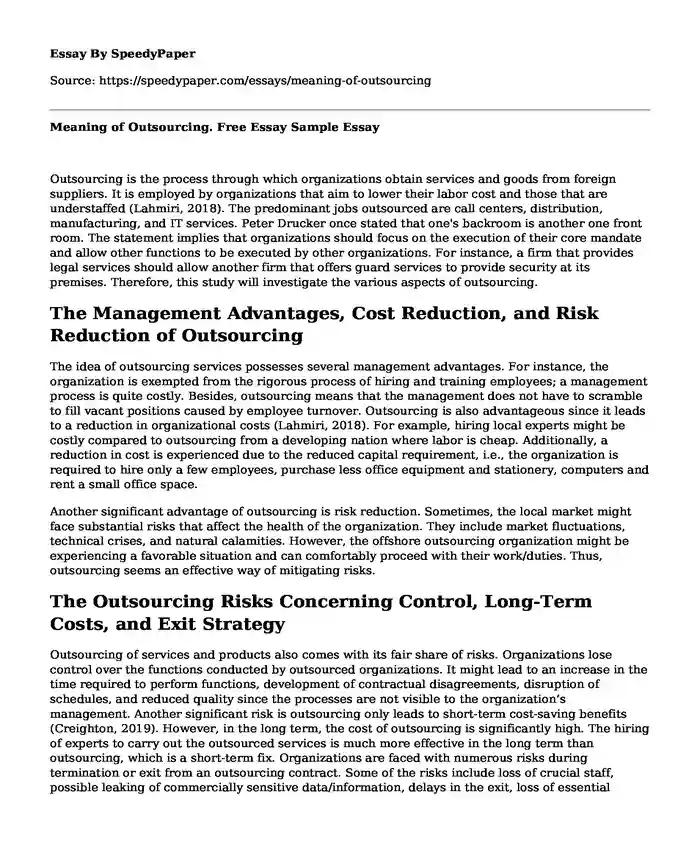
| Essay type: | Definition essays |
| Categories: | Job Risk management International business |
| Pages: | 3 |
| Wordcount: | 722 words |
Outsourcing is the process through which organizations obtain services and goods from foreign suppliers. It is employed by organizations that aim to lower their labor cost and those that are understaffed (Lahmiri, 2018). The predominant jobs outsourced are call centers, distribution, manufacturing, and IT services. Peter Drucker once stated that one's backroom is another one front room. The statement implies that organizations should focus on the execution of their core mandate and allow other functions to be executed by other organizations. For instance, a firm that provides legal services should allow another firm that offers guard services to provide security at its premises. Therefore, this study will investigate the various aspects of outsourcing.
The Management Advantages, Cost Reduction, and Risk Reduction of Outsourcing
The idea of outsourcing services possesses several management advantages. For instance, the organization is exempted from the rigorous process of hiring and training employees; a management process is quite costly. Besides, outsourcing means that the management does not have to scramble to fill vacant positions caused by employee turnover. Outsourcing is also advantageous since it leads to a reduction in organizational costs (Lahmiri, 2018). For example, hiring local experts might be costly compared to outsourcing from a developing nation where labor is cheap. Additionally, a reduction in cost is experienced due to the reduced capital requirement, i.e., the organization is required to hire only a few employees, purchase less office equipment and stationery, computers and rent a small office space.
Another significant advantage of outsourcing is risk reduction. Sometimes, the local market might face substantial risks that affect the health of the organization. They include market fluctuations, technical crises, and natural calamities. However, the offshore outsourcing organization might be experiencing a favorable situation and can comfortably proceed with their work/duties. Thus, outsourcing seems an effective way of mitigating risks.
The Outsourcing Risks Concerning Control, Long-Term Costs, and Exit Strategy
Outsourcing of services and products also comes with its fair share of risks. Organizations lose control over the functions conducted by outsourced organizations. It might lead to an increase in the time required to perform functions, development of contractual disagreements, disruption of schedules, and reduced quality since the processes are not visible to the organization’s management. Another significant risk is outsourcing only leads to short-term cost-saving benefits (Creighton, 2019). However, in the long term, the cost of outsourcing is significantly high. The hiring of experts to carry out the outsourced services is much more effective in the long term than outsourcing, which is a short-term fix. Organizations are faced with numerous risks during termination or exit from an outsourcing contract. Some of the risks include loss of crucial staff, possible leaking of commercially sensitive data/information, delays in the exit, loss of essential software, assets or intellectual property, significantly high unplanned expenses, and discontinuation of supply of critical services (Lahmiri, 2018). It is vital to have a well-planned and logical exit strategy, or things could go wrong.
Discuss Which Company You Would Outsource to And Why. Does Distance Matter?
Between the two companies, I would give the contract to the Indian firm. Their bid was slightly lower than that of Canada. The Mumbai firm is a solution to the main reason behind the outsourcing plan – reduction of cost. Canada would not be a viable solution since its conditions and economy is quite similar to that in the country and would translate a slight decrease in cost. Besides, the main idea behind outsourcing is cost savings and competitive pricing. Distance is a major deterring factor, especially when dealing with goods (Mathew, 2017). In this case, distance does not matter since the services are conducted via the Internet.
Conclusion
Outsourcing is the process of procuring services and products from foreign providers. Its main benefits are cost-saving and risk management. However, its risks include high long-term costs, exits or termination rise, and loss of control over functions. Distance impacts outsourcing, but it is not a problem if the benefits outweigh the possible costs.
References
Creighton, M. (2019, Feb 19). What is the real cost of outsourcing? Retrieved from Training Journal: https://www.trainingjournal.com/articles/opinion/what-real-cost-outsourcing
Lahmiri, S. (2018). Information Technology Outsourcing Risk Factors and Provider Selection. InInformation Technology Risk Management and Compliance in Modern Organizations(pp. 214-228). IGI Global.
Mathew, S. K. (2017). Risk Assessment in IT Outsourcing. In GLOBAL SOURCING OFSERVICES: Strategies, Issues, and Challenges (pp. 589-608).
Cite this page
Meaning of Outsourcing. Free Essay Sample. (2023, Aug 10). Retrieved from https://speedypaper.com/essays/meaning-of-outsourcing
Request Removal
If you are the original author of this essay and no longer wish to have it published on the SpeedyPaper website, please click below to request its removal:
- Free Essay Including Questions on Crisis Management and Job Interviews
- Airline Industry Research Paper Example on the AirAsia X Company
- Research Paper Sample: Experiences of Managing the Study, Work, and Life in Undergraduate Students
- The Bike Riding Startup - Business Plan Essay Sample
- Free Essay Investigating Value Chain Configuration
- Essay Sample: Why Do I Want to Enter the Dental Hygiene Profession?
- To: Uber CEO Dara Khosrowshahi. Essay Sample
Popular categories




